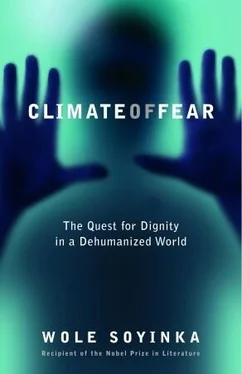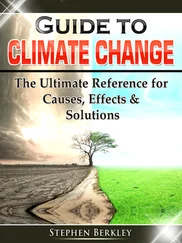For those who claim the authority to pronounce a fatwa, even on nonbelievers, this is surely a moment for a universal fatwa, binding on all faithful, no matter their political convictions. No, I do not intend the terminating fatwa that, regrettably, has become most commonly identified with this word, but its original, broader intent — a binding injunction. Such a fatwa would mandate all faithful to embark on the religious and political ostracism of all who were involved in this deed, and declare Basayev’s misnamed Riyadus Salikhin—“Garden of the Pious”—the poisoned garden of impiety. The world requires a practical expression of the ethical will that moved numerous spokesmen of the faith to denounce the Beslan atrocity as a distortion of the moral compass of Islam. This is a latter-day King Herod, desperate to preserve his patch of power, one who surely defiled the justice of Chechnyan aspirations, transgressed the last bastion of toleration, and corrupted the shrinking ethical space that is still left for humanity. The Community of Faith on behalf of whom this “liberator” claims to exercise his mandate should take the lead in subjecting him and his cohorts to the mandate of universal justice.
Wole Soyinka September 2004
“A Changing Mask of Fear,” the first of the five-lecture series Climate of Fear, was delivered at the Royal Institution in London in March 2004. During the question-and-answer session, I offered a view that the president of the United States had deliberately exaggerated suspicions of the existence of weapons of mass destruction in Iraq. By contrast, I cautioned, it was impossible, and dangerous, for him or anyone else to underestimate the menace posed to the world by al-Qaeda. A voice from the audience vehemently disagreed with the second part of that comment.Yes, without question, George Bush had gone chasing shadows in Iraq, but to suggest that there was any more substance to al-Qaeda, a force that had been definitively routed from Afghanistan, was merely buying into a warmonger’s fantasies.
Virtually the morning after that exchange, the “corpse” of al-Qaeda unleashed a horrendous attack on the civilian population of Spain, littering the railway tracks of Madrid with human parts. Once again, the surprise of the event was that anyone could have been taken by surprise.
Much more happened in that vein, not always so bloody perhaps, during those widely spaced lectures, and more has happened since. Such incidents have been merely symptomatic of the dilemma of our times. As the lecture series continued, several events would strike me — and others also, from their comments — as unrehearsed but deadly or cautionary counterpoints of reality to the series.These would include statements from world leaders, government policy decisions, self-justifications, self-reversals, military scandals, religion-inspired massacres and reprisals, and so on. A number were spurts of deadly interjections from those entities that, in this series, I have described as the quasi-state. My mind could not help, for instance, but revisit the postlecture exchanges on the theme of dignity when the scandal of the maltreatment, abuse, and torture of Iraqi prisoners and detainees at the hands of the coalition forces broke.What is so often hushed up had finally entered the public domain, and with a brutal efficacy that could only shock and bewilder.
There they were, the would-be liberators, dehumanizing their prisoners and evidently relishing the experience. At once the contention of power and dignity was bared — literally — in blistering images. The world was treated to the performance of power when it becomes suddenly accessible to the powerless in relation to the even more powerless: the result was a graphic demonstration of the undiscriminating arrogance of power, manifested in the personal and sexual humiliation of the weaker, those who were made so only by circumstances, not by any intrinsic qualities, not by others’ social or economic superiority — simply by circumstances that could be reversed at any moment.
Those circumstances were indeed reversed, and with an even more sickening escalation of horror, as a hostage was offered up to the world as a sacrificial lamb. The gruesome beheading of a hapless hostage in the name of reprisal, carried out in a manner that was clearly orchestrated toward global consumption, leapfrogged the incontinence of the U.S. Army reservists in its barbarity, its arrogance and intensity of visceral laceration.
Was this killing purely an act of vengeance? If it were, the event would be recorded simply for periodic savoring of the wages of vengeance and/or sadistic pleasure by the perpetrators. Staged deliberately for global instruction, however, it can be read also as another statement of power, directed at the world. The quasi-state sets its own laws and strikes at will.This exhibitionist act was of a different nature from the mob fury that was unleashed on the four American contractors, the mutilated corpses of two to be later hung upside down over a bridge in an ultimate act of desecration. That was a blood frenzy that belonged more within the psychopathology of mob susceptibility than to the statement of power. The bloody execution of a hostage, by contrast, the manner of its staging, was the communication of power, however desperate and transient.
I doubt, however, that this very act has raised the general level of fear in the mind of the average individual or, indeed, in the minds of the community. Certain acts are so far beyond the pale that they arouse the opposite emotions — anger, loathing, disgust, and contempt. Contempt for the cold-blooded competitors in the stakes of human degradation.
Alas, we can hold to account only those who accept, are bound by, or can be compelled to adhere to our code of accountability. The American forces of occupation belong within these categories; thus it is possible to express the view that they belong, like Milosěvić and others, at a tribunal for crimes against humanity. If the comparative status of this crime appears not to warrant the attention of that eminent body, however, then perhaps it is time to revisit the Rome Convention and set up lower courts for crimes of lesser magnitude that nonetheless fall within the category of dehumanization, although not quite on the scale of genocide or “ethnic cleansing.” The essence of this is to make the accused — wherever and whenever — undergo a structured passage of international opprobrium, as opposed to in-house disciplinary action that only ends with the convicts selling their stories on prime time for hundreds or thousands of dollars. Already, the spectacle of the identified perpetrators strutting around their hometowns, making free with the American media, giving self-justifying interviews, is almost as revolting as the very crimes over which the world has risen in uproar.
Is the spiral of antihumanism now unstoppable? If so, where will it lead? Constantly immersed in the cumulative denigration of human sensibilities, only to have one’s most pessimistic predilections topped again and again by new acts — or revelations — of the limitless depth to which the human mind can sink in its negative designs, one is tempted to declare simply that the world has now entered an irreversible state of global anomie.
However, in addition to the existence on the same globe of communities that stubbornly set their course on a faith in the redemptive potential of the social being as a creature of lofty aspirations — the existence of nations and organizations that establish structures for contesting inhuman acts not merely on moral but on agreed-upon legal principles — there are also reminders here and there, on both major and minor scales, of a constant striving toward the option of healing, and the establishment of just and humane communities. It is for this reason that I consider it perhaps of some value, however limited, to co-opt, as the final word of this brief preface to a rather gloomy exposition, the following excerpt from a letter I recently received in response to the lectures.
Читать дальше












